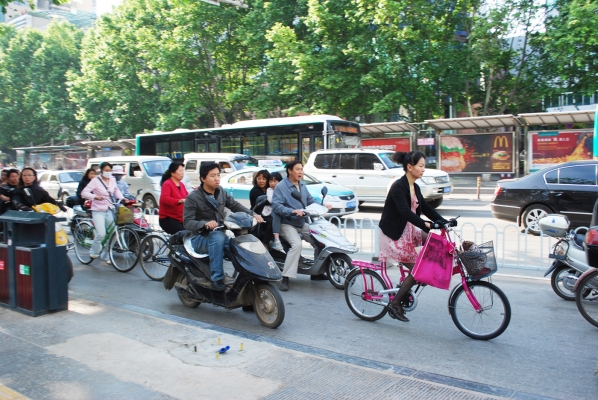China visit shows massive shift to autos

For rapid transportation mode-share changes, it’s hard to beat Kunming, China, where OTREC Director Jennifer Dill is visiting this week. In recent years, car and transit trips have quadrupled. Bicycling, which used to account for more than half of trips, now makes up less than a quarter.
Dill is with a team visiting Kunming as part of the PSU-China Innovations in Urbanization program.The visit is led by professor Connie Ozawa, director of Portland State University's Nohad A. Toulan School of Urban Studies & Planning (TSUSP), and includes: professor Yiping Fang; practitioner-in-residence Gill Kelley, former planning director of the city of Portland; Dean Marriott, city of Portland’s director of environmental services; and Jianhong Ye, a post-doctorate fellow at TSUSP.
The team participated in a workshop with over 50 planners from the region, sharing information on how Portland plans for sustainability. The visit is hosted by the Energy Foundation and the city of Kunming.
Like many cities in China, .jpg) Kunming is facing tremendous growth pressures and increasing motorization. Between 1995 and 2011, car ownership went up from 20 cars per 1,000 people to 150 per 1,000. As a result, the share of trips by automobile quadrupled, from about 6 percent to 23 percent. At the same time, the city invested in bus rapid transit, and transit trips increased from less than 5 percent to about 20 percent.
Kunming is facing tremendous growth pressures and increasing motorization. Between 1995 and 2011, car ownership went up from 20 cars per 1,000 people to 150 per 1,000. As a result, the share of trips by automobile quadrupled, from about 6 percent to 23 percent. At the same time, the city invested in bus rapid transit, and transit trips increased from less than 5 percent to about 20 percent.
As a consequence of this motorization, bike trips have fallen from 54 percent to 24 percent. The major streets Dill saw had wide cycle tracks, but these were used predominantly by people on electric scooters. Sometimes car drivers even used the cycle tracks to avoid traffic congestion.
In Dill’s presentation to the group, she showed how Portland has decreased reliance on private autos and increased shares of bicycling and transit. From the conversations that ensued, she reflected that “the planners in Kunming seemed particularly interesting in the challenges of how to get things implemented—the policies, processes, and people. We hope to continue to collaborate with them to learn from each other.”
